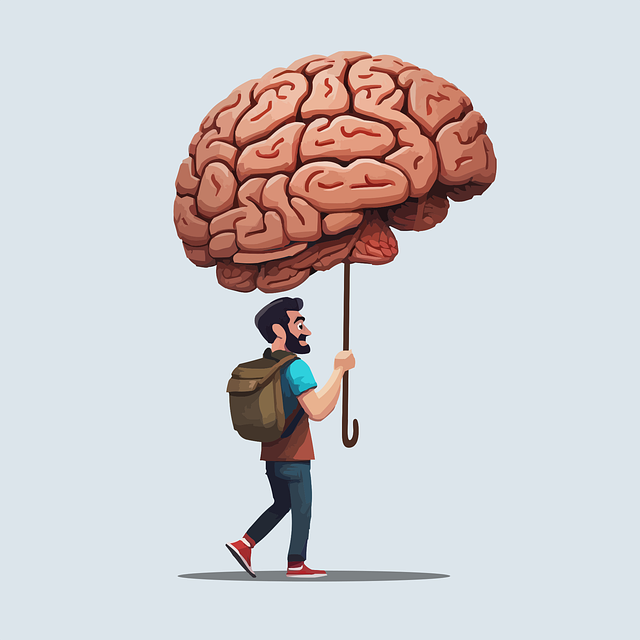Emotional intelligence (EQ) is a vital skill for children's well-being, especially those with Obsessive Compulsive Disorder (OCD). Early identification of OCD symptoms and tailored therapy, such as Cognitive Behavioral Therapy (CBT), are key. CBT equips kids with coping mechanisms to challenge negative thoughts and behaviors, boosting EQ and self-esteem. This comprehensive approach addresses OCD's root causes, enhances emotional expression, and revolutionizes lives affected by the disorder. The Mental Wellness Podcast Series offers valuable resources for parents and caregivers supporting their child's emotional growth.
Emotional intelligence (EQ) is a crucial aspect of child development, especially for those facing challenges like obsessive-compulsive disorder (OCD). Understanding EQ and its impact on children is the first step towards fostering healthy emotional growth. This article explores strategies to build EQ in kids with OCD, highlighting the essential role of therapy in managing symptoms and enhancing their ability to navigate emotions effectively. By identifying signs of OCD and implementing tailored interventions, parents and caregivers can empower children to develop resilience and improve their overall well-being.
- Understanding Emotional Intelligence and Its Impact on Children
- Identifying Signs of Obsessive-Compulsive Disorder (OCD) in Kids
- Strategies for Building Emotional Intelligence in Children with OCD
- The Role of Therapy in Enhancing Emotional Intelligence for OCD Management
Understanding Emotional Intelligence and Its Impact on Children

Emotional intelligence (EQ) is a vital skill for children to develop as it significantly impacts their overall well-being and success in life. It involves recognizing, understanding, and managing one’s emotions, as well as empathizing with others. High EQ helps children navigate social interactions, build strong relationships, and make thoughtful decisions. When children possess emotional intelligence, they are better equipped to handle stress, resolve conflicts, and express their feelings healthily—all essential components for mental wellness.
For kids struggling with conditions like Obsessive-Compulsive Disorder (OCD), EQ can be a game-changer. Therapy for Children with OCD often incorporates strategies to enhance emotional intelligence, which in turn boosts resilience building and confidence. The Mental Wellness Podcast Series Production provides valuable resources and insights into these topics, offering practical tips and techniques that parents and caregivers can use to support children’s emotional growth, especially those facing challenges like OCD.
Identifying Signs of Obsessive-Compulsive Disorder (OCD) in Kids

Identifying OCD symptoms early on is crucial for effective therapy for children with Obsessive-Compulsive Disorder. Kids may exhibit signs of distress, such as excessive worry or repetitive behaviors. For instance, they might become obsessed with cleanliness and engage in ritualistic handwashing, or struggle with intrusive thoughts that trigger anxiety. These manifestations can significantly impact their daily lives, affecting school performance and interactions with peers.
Mental health professionals play a vital role in risk management planning for children with OCD. They can provide strategies to enhance emotional intelligence, thereby helping kids understand and manage their emotions better. Depression prevention is another critical aspect of treatment, as OCD often co-occurs with depressive disorders. Through therapy, children learn coping mechanisms to reduce anxiety, challenge negative thoughts, and develop healthier habits, ultimately improving their overall well-being.
Strategies for Building Emotional Intelligence in Children with OCD

Building emotional intelligence (EI) in children with Obsessive Compulsive Disorder (OCD) is a crucial aspect of their overall well-being and therapy. Cognitive Behavioral Therapy (CBT), specifically tailored for OCD, can be an effective strategy. This form of therapy helps children identify and challenge distorted thinking patterns related to their obsessions and compulsions, fostering a more balanced emotional response. By learning coping mechanisms, such as mindfulness techniques and relaxation exercises, kids with OCD can manage their anxiety symptoms and gain better control over their behaviors.
Crisis intervention guidance is another valuable tool during this process. Training children to recognize the signs of an emotional crisis and providing them with age-appropriate strategies to self-regulate can be life-saving. Encouraging open communication about feelings and emotions, while teaching empathy towards others, contributes to developing a stronger EI. These interventions not only aid in anxiety relief but also empower children with OCD to navigate their emotional landscape more effectively.
The Role of Therapy in Enhancing Emotional Intelligence for OCD Management

For children struggling with Obsessive Compulsive Disorder (OCD), therapy plays a pivotal role in enhancing emotional intelligence and managing symptoms effectively. Cognitive Behavioral Therapy (CBT) is particularly effective, focusing on identifying and changing unhelpful thought patterns and behaviors. This process empowers kids to understand their emotions better, improving self-esteem and reducing anxiety associated with OCD.
Through specialized therapy sessions, children learn valuable coping strategies and gain insight into their obsessions and compulsions. A well-structured Community Outreach Program implementation can complement these efforts, fostering a supportive environment where emotional intelligence is nurtured. By addressing the underlying causes and promoting healthy emotional expression, therapy becomes a powerful tool in transforming lives affected by OCD.
Emotional intelligence is a vital tool for managing conditions like Obsessive-Compulsive Disorder (OCD) in children. By understanding and recognizing emotional cues, kids with OCD can learn effective coping strategies and enhance their overall well-being. The article has highlighted the importance of early intervention through therapy tailored to address OCD symptoms while fostering emotional intelligence development. Through these integrated approaches, professionals can empower children to navigate their emotions healthily, leading to improved mental health outcomes in the long term. For parents and caregivers, seeking therapy for Children Obsessive Compulsive Disorder is a proactive step towards nurturing resilience and emotional literacy in young minds.










